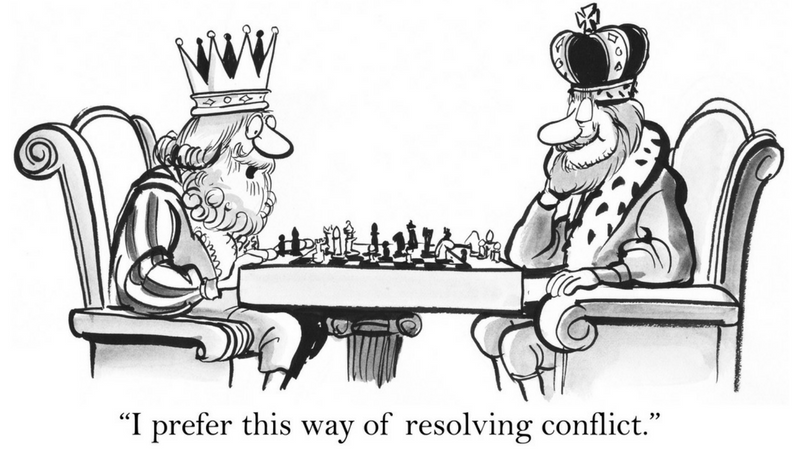DEAR MAN Helps Difficult Conversations
Relationships are a hot topic in my Living Grace groups. Many of us living with chronic mental illnesses like Borderline Personality Disorder and bipolar disorder have a history of acting out in our relationships and attracting toxic relationships. Often, unafraid to use our voices, we will demand others do things or respond to us in specific ways – though how we ask is commonly inappropriate. Others grew up in abusive households, silencing their voices and diminishing their needs in an effort to be overlooked and avoid the worst the abuser might do.
What’s consistent across both of these scenarios is that we have legitimate needs and are not getting those needs met effectively. Finding a healthy way to express our needs in our relationships is an important step on the road to emotional help. Thankfully, Marsha Linehan of DBT fame has a great acrostic to help us with this: the DEAR MAN skill.
Before we even get to the DEAR MAN skill, however, it’s helpful and useful to take a step back from the situation. We want to take a look at the situation through clear eyes and make sure we are clear on exactly what happened. After that, we take a look at our emotional response and determine how well it fits the situation.
Next, we determine what we want. What is the objective we want to achieve? Maybe it’s not hearing that our emotions are invalid, or perhaps it’s not being introduced as “my crazy cousin Bella.” Or, perhaps we don’t like it when our friend is late to meet us for lunch. The idea here is to get specific: Exactly what responses or changes do I want to see from the other person?
Next, we think about the relationship and our goals within it. Is this a relationship we want to keep? Is this a relationship we want to improve? Or is this a relationship that we OK with losing, though we’d rather keep it?
Shifting the focus to the conversation we want to have, we ask: How do I want them to feel about me after it’s over? Are we looking for respect, kindness, or trust? Or something else entirely? And what about us? How do we want to feel after it’s over? What about if we don’t get what we are asking for?
As we have this conversation, it’s important that we do not compromise our values. So, we need to act and speak in a way that respects our beliefs, is in line with our morals, and helps us feel competent and effective.
As we consider all these questions, it’s important to think about what we can say or do that helps us achieve these goals.
Having defined our goals, we can start to approach the DEAR MAN skill. DEAR MAN stands for:
Describe
Express
Assert
Reinforce
Mindful
Appear confident
Negotiate
Let’s start with the DEAR part of the skill:
Describe: Describe the current situation. Stick to the facts; avoid using judgment language (you always, you never, etc.).
Express: Share your feelings and opinions on the situation. Here, we are making sure we don’t assume the other person knows how we feel or what we think. Again, keep this calm and avoid judgment words like “should/shouldn’t.” Instead, use words like “want/don’t want.”
Assert: In this part, we express precisely what we want, or we make sure we are giving a clear “no.” People aren’t mind-readers, so here it is important to use clear language.
Reinforce: People respond to honey better than they respond to sticks! Express what benefit they get from responding to your request. To the extent possible, avoid ultimatums.
So, what does this look like in real life? Here’s a situation I had:
With my gym membership, I was attending a pool class three mornings a week. We were in a therapy pool, which meant tight confines. I’d been absent for a little bit, and we had some new people in the class when I returned.
One morning, a husky man was walking down the pool deck before class, and I heard the murmurs from my classmates: “Here comes Raymond. Be prepared to give hugs.” No one seemed excited about it, but they also seemed to accept it was just an expected behavior for him.
My heart rate rose, and I was incredibly uncomfortable. I was dealing with some sensitive topics in therapy at that time and having a strange man approach me and force me into a hug made me uncomfortable. In retrospect, the instructor should have stepped in; that behavior was unusual and abnormal for the situation.
I got lucky that we were discussing DEAR MAN in my DBT class at the same time this situation happened, and we workshopped an answer. First, we determined that the responsibility to correct the behavior fell on the instructor. It was her job to make sure the class environment was warm, welcome, and non-threatening.
Then, we workshopped the script:
Describe: “When I was in class the other day, a new student entered the pool and insisted on hugs all the way around.”
Express: “I felt pressured, uncomfortable, and unsafe because I didn’t know this man and I’ve never seen this behavior in our class before. It made me uncomfortable enough that I considered not returning.”
Assert: “I would like you to have a conversation with Raymond and ask him to stop asking for hugs when he enters the pool.”
Reinforce: “I really enjoy this class, and I’m seeing the benefits from it. Feeling safe will encourage me to continue coming and participating.”
I was nervous about the idea of using a script, but the teacher encouraged me to write it down and read it, so I didn’t forget any of it. It was good advice: When I spoke with the instructor, I was reassured that I wouldn’t forget anything, and seeing it prepared like that gave her a sense of its importance to me.
It turns out that she wasn’t aware of Raymond’s behavior, as he arrived at the pool before she did. She was surprised to hear what he was doing and instantly agreed that his hugs were not appropriate for the gym environment. She promised me she would have a little chat with him and advise him to stop.
I felt immense relief.
Sometimes, however, the conversations don’t go exactly as we’ve planned, or as smoothly as mine did. In that case, we move on to the MAN part of the skill:
Mindful: Stay mindful and focused on our goals. We avoid getting distracted or dragged off-topic (“well, I only do THIS because you do THAT”) and maintain our position. After all, we know what we want and that it is important to us.
If we need to, we employ the “broken record” approach: Keep asking, keep saying no, or keep repeating your opinion. Sometimes, the message we need to send is hard for the other person to hear and all we can do is keep repeating it. (“If you’re going to be late for lunch, please text me.”)
Even if the other person shifts to personal attacks, keep taking the high road and keep making your point. (“I still would like a text message.”)
Appear confident: This is all about language and tone. We don’t whisper or stare at the floor, or answer “Maybe” or “I’m not sure” when we are challenged. We stand tall and speak calmly, no matter how fast our heart is beating or how sweaty our palms are.
Negotiate: Sometimes, what we are asking for isn’t the only possible solution to the scenario. When we are willing to “give to get,” inviting the other person into the solution, we often find a better answer than the one we started with.
We may reduce our request (from “text me if you’re not going to be on time” to “text me if you’re going to be more than 15 minutes late”), or we can invite the other person to give a better solution. “If texting isn’t reasonable, what do you suggest we do so I don’t feel frustrated and angry when you arrive late for lunch?”
If you are new to the DEAR MAN skill, I recommend using it on small, simple things to begin with. Get accustomed to using it; over time, I think you’ll find that it comes more and more naturally to you. Also, it will help you get a feel for how conversations go, which will help you better prepare for bigger or more challenging situations.
DEAR MAN is one of my favorite relational skills because it’s helped me focus on what’s important and given me a way to express myself and use my voice in a way that’s helped me grow and mature my relationships, rather than tearing them down.
It helps me, and I hope you find the same.
Do you use a script when you have a relationship challenge? How do you think the DEAR MAN skill could help you?
Looking for daily inspiration and community? Join our warm and supportive Facebook group!









